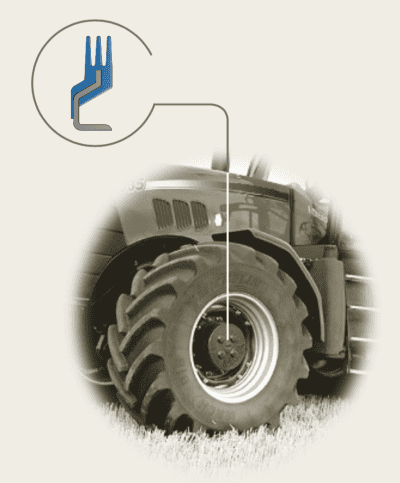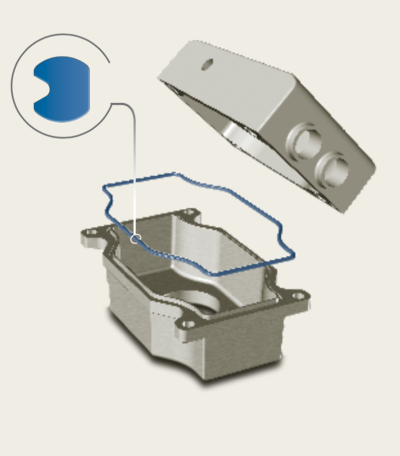研发能力
可行性研究
在客户产品研发项目中,泰克尼尔技术团队将提供咨询支持:根据所选的制造工艺对产品进行优化。与客户一起审查产品的最终定型设计,包括密封性能、材料和公差等级。
材料选择
考虑材料和特定配方选择的因素包括:橡胶类型、交联剂、硬度、压缩永久变形等。每种材料配方都具有独特的特性。根据应用、接触的介质和所需的机械性能,泰克尼尔技术团队会推荐合适的材料配方。
合模线定义
凭借对工艺的了解和掌握,泰克尼公司可将合模线定义在对密封功能影响最小的区域,当然需要事先得到客户的批准。
公差d
根据所选工艺和现行国际标准,对橡胶弹性体产品做公差等级定义。需要注意的是,橡胶产品具有柔韧性和可变形性,因此塑料或金属部件的公差标准并不能适用于橡胶产品。
在制图时,我们建议采用对中公差。由于成型工艺、模具制造和材料收缩等原因,橡胶成型工艺无法通过偏心公差来达到节省原料的目的。
泰克尼尔的技术团队倾向于客户提供
STEP/STP 格式的3D 文件(对中尺寸)来进行模具开发。

客户的特殊技术要求
当客户对某个应用的密封产品有明确的想法时,泰克尼尔贡献其专业知识:
- 全面审查技术规范(动态/静态、介质、温度、压力、标准和认证)
- 优化密封设计
范例:农业机械的防污染密封
客户数据和要求
- 通过实地测试验证密封件性能
- 工况(压力、速度、温度)
- 测试结果:在实际工况下验证密封效果
技术实施
- 选择最佳的耐磨材料
- 建议配合零部件做表面处理
- 优化密封轮廓以提高密封唇的性能
- 测试实样以验证密封性能

功能性要求规范
- 审查客户功能性要求
- 提出一种或多种密封解决方案
- 初样和批量产品报价
范例:电控部件壳体密封
技术实现
- 设计合适的密封件截面
- 选择环保型材料配方
- 增加产品的T-Lub®表面处理,以方便产品的自动装配
客户数据和要求
- 壳体内外的静态密封
- 工作温度范围广
- 耐高压水压
- 适用于自动装配

初样设计
客户考虑生产样品,是为核查密封性能,节省设计时间,并避免在批量生产过程中对量产模具进行修改。泰克尼尔提供多种样品制作工艺。
机加工工艺产品
产品必须符合以下加工标准:
- 高硬度:橡胶弹性体为83 IRHD以上,热塑性聚氨酯(TPU) 为 90 至 95 IRHD
- 旋转形制的部件(可进行额外铣削、钻孔、攻丝等加工)
- 最小半径为0.4 毫米
- 无开模成本
- 交货期极短
切割工艺产品
泰克尼尔的Chromex工厂切割产品部门,可以通过自动切割线生产弹性体密封产品。该工艺适用于生产平垫片,可根据材料的不同制作出厚度为1 至 15 毫米的大多数 2D 截面形制产品。
SLA立体光刻工艺
泰克尼尔可提供通过立体光刻技术产出硅胶样件。此类聚氨酯树脂或硅橡胶树脂部件具有类似于弹性体的机械性能。光固化成型工艺可处理复杂的二维和三维截面产品。
样品模具
专为模压工艺而设计,具有减少型腔数量的特点。
优点包括:
- 提高样件的代表性
- 与量产品相同的配方材料
- 多维参数验证
- 经济性、可调节性、方便应用
质量监测
证书
泰克尼尔公司可根据要求提供以下证书:
- 2.1 - 无检验结果的批次订单符合性声明
- 2.2 - 批次订单与非特定检验结果相符声明
- 3.1 - 有具体检验结果的批次订单符合性声明
初样(IS Initial Sample)提交文件
初始样品(IS) 是量产模具产出的首批批产零件。它们是工艺和工具鉴定和验证的基础。这些IS 件通常附有提交文件或PPAP文件(生产件批准程序)。
根据零件的不同等级要求,客户需要不同的文件等级(1、2 或3)。Techné 提供不同等级文件报价,其中可能包括:
- VDA 封面页
- 尺寸解咒
- ·材料性能
- 图纸
- 过程 FMEA
- 生产流程图
- 控制计划
- 工艺能力
- 检查器具清单
- R&R(可再现性和可重复性)
- 安全数据表
- 材料数据表
- IMDS 声明(国际材料数据系统)
- DET 表(包装和运输说明)
- 证书(如上所述)Capacity summary
- 产能研究
- 模具照片
- 等

